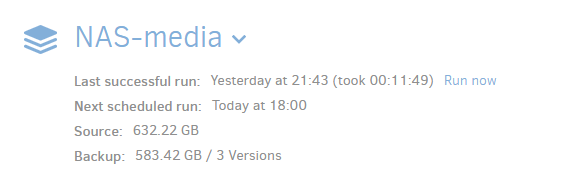Okay, this is embarassing: the solution was there in front of our eyes all along. ![]() Look at this:
Look at this:
And then this:
https://forum.duplicati.com/uploads/default/original/1X/89e3caca9c2c141ba18afc869829394fffaddb13.png
and this:

Notice something?
My default.m3lib is in the media share. But the error came from the together share (apparently I had copied the file there some time ago as a temporary backup and never deleted it. I didn’t realize that and kept looking at the wrong file. I’m sorry for stealing your time with this.
I can say though, that I did learn some stuff, so thanks for that.
So here is what happened when I adjusted the access rights for the file that was actually causing the errors in the first place:
- The backup job completed with a fatal error:
8 Dec 2017 21:42: Message
Fatal error
Duplicati.Library.Interface.UserInformationException: Found 1 files that are missing from the remote storage, please run repair
at Duplicati.Library.Main.Operation.FilelistProcessor.VerifyRemoteList(BackendManager backend, Options options, LocalDatabase database, IBackendWriter log, String protectedfile)
at Duplicati.Library.Main.Operation.BackupHandler.PostBackupVerification()
at Duplicati.Library.Main.Operation.BackupHandler.Run(String[] sources, IFilter filter)
- I did not run repair but just ran the backup again. And this time it finished without any error. Phew!

However, it looks to me like the “fatal error” was caused by the file not being backed up due to lack of access permission. In other words:
(i) duplicati backs up files but fails to access one of them and issues message (it’s not even a warning, which is also strange).
(ii) when the backup runs again it finds that file missing from the backup archive, thinks the database must be corrupted and asks for a repair.
(iii) when the backup runs yet another time, the file is correctly backed up (due to changed access rights) and there are no more errors.
My question: instead of assuming that there is a problem with the database, shouldn’t duplicati have “remembered” that the file couldn’t be backed up?
My guess is that when a file fails to be backed up, duplicati nonetheless writes it into the database as part of the backup. So this is probably what needs to be changed: only write files into the database if upload succeeded. That might save us a lot of “fatal errors” and unnecessary db repairs…